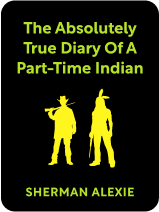

This article is an excerpt from the Shortform summary of "The Absolutely True Diary of a Part-Time Indian" by Sherman Alexie. Shortform has the world's best summaries of books you should be reading.
Like this article? Sign up for a free trial here .
What The Absolutely True Diary of a Part-Time Indian themes are present in the story? How can the themes help you understand the story?
In The Absolutely True Diary of a Part-Time Indian, themes are an important part of the story since they convey the lessons Junior learns throughout the story.
Learn more about The Absolutely True Diary of a Part-Time Indian themes below.
The Absolutely True Diary of a Part-Time Indian Themes
Here are 6 The Absolutely True Diary of a Part-Time Indian Themes that you should know in order to understand the book.
1. Racism
Junior’s old geometry teacher, Mr. P, can’t be too upset with Junior for breaking his nose. Mr. P, who’s white, still feels guilty for beating his students in the early days of his teaching career. All the teachers had been taught to “kill the Indian to save the child,” to beat all of the Indian’s culture out of him. Mr. P feels like he deserves to be smashed in the face with a book. He wants more for Junior than the reservation can give him. Junior needs to venture out into the world, even though he’ll encounter persistent racism there. This is one of the consistent The Absolutely True Diary in a Part-Time Indian themes.
2. Identity and Belonging
In The Absolutely True Diary in a Part-Time Indian, themes of identity and belonging are important. As he struggles to fit in at his new school, Junior feels like he’s split in two: He wakes up as an Indian (Junior) and arrives at Reardan as a nobody (Arnold).
He doesn’t feel like he belongs on the reservation, either. Many Indians think you become as good as white if you aspire to a better life, and Junior faces many people on the rez who think of him as a traitor for going to school outside the reservation.
3. Poverty
Junior says that most people think the worst thing about being poor is being hungry. He acknowledges that sometimes, he and his family go upwards of 18 hours without eating because they don’t have the money for food. But Junior always knows that eventually, one of his parents will come home with KFC. And KFC tastes even better when you’re hungry.
For Junior, the worst thing about being poor isn’t hunger. It’s the inability to save his best friend, his dog Oscar. When Oscar gets sick, Junior begs his mom to take Oscar to the vet, but the family doesn’t have the hundreds of dollars needed for the operation. Junior’s father shoots Oscar to put him out of his misery. Bullets only cost two cents.
Junior sometimes wants to blame his parents for their poverty, but he knows he can’t. He knows his family’s poverty is not his parents’ fault, and he knows they dreamed of more. But no one on the reservation realizes their dreams. They don’t get the chance. They’re too poor. And that creates a cycle that’s hard to escape.
- First, you believe you’re poor because you’re stupid.
- Then, you believe you’re stupid because you’re Indian.
- Finally, because you’re Indian, you believe you will always be poor, and the cycle repeats itself.
Poverty doesn’t make you strong or perseverant. Poverty just “teaches you how to be poor.” This is another one of the continual themes in The Absolutely True Diary of a Part-Time Indian.
4. The Importance of Dreams and Hope
Mr. P tells Junior that the only thing that white teachers and Indian parents are teaching reservation kids is how to give up. If Junior stays on the rez, his hope will be snuffed out. Mr. P tells Junior to take his hope and find others who have hope. And the further Junior goes from the hopeless reservation, the more hope he’s likely to find. This is how Junior ends up at Reardan.
5. Alcoholism
Junior’s family doesn’t have money for presents at Christmas, so his father does what he always does when there isn’t enough money for something: He takes what they do have and gets drunk. He’s gone from Christmas Eve until January 2nd. Junior continues to deal with alcoholism in his family, and it is one of the themes in The Absolutely True Diary in a Part-Time Indian.
When he gets back, he’s so hungover that he can’t get out of bed. Junior goes into his room to say hello, and his dad apologizes about there being no presents at Christmas. Junior tells him it’s okay, but it isn’t. He realizes that he’s once again trying to protect the man who repeatedly breaks his heart, but he also knows how much his dad loves him and how hard his dad tries.
6. Friendship
Rowdy is Junior’s best (human) friend. (Junior’s best friend is his dog, Oscar.) Junior considers Rowdy to be the “most important person in [his] life,” even more important than the members of his own family. Friendship is one of the most important themes in characters in The Absolutely True Diary in a Part-Time Indian.
Rowdy is the toughest kid on the reservation. He’ll fight anyone—girl or boy, child or adult, human or dog. He even throws punches at the rain. When Junior tells Rowdy that he’s transferring to Reardan, Rowdy is so upset that he ends up punching Junior and giving him a black eye. Rowdy and Junior become rivals on the basketball court and sworn enemies for the rest of the school year.

———End of Preview———
Like what you just read? Read the rest of the world's best summary of Sherman Alexie's "The Absolutely True Diary of a Part-Time Indian" at Shortform .
Here's what you'll find in our full The Absolutely True Diary of a Part-Time Indian summary :
- How Junior gets split between two worlds when he goes to a mostly white school
- How Junior overcomes being an outsider to being part of welcoming social circles
- The tragedies of alcoholism and poverty that leave Junior with renewed strength






